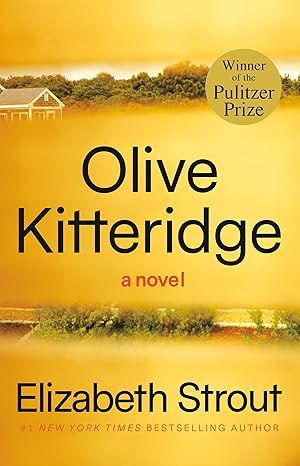Olive Kitteridge
4.2
-
30,647 ratings
WINNER OF THE PULITZER PRIZE • The beloved first novel featuring Olive Kitteridge, from the #1 New York Times bestselling author of My Name is Lucy Barton and the Oprah’s Book Club pick Olive, Again
“Fiction lovers, remember this name: Olive Kitteridge. . . . You’ll never forget her.”—USA Today
“Strout animates the ordinary with astonishing force.”—The New Yorker
One of the New York Times’s100 Best Books of the 21st Century
A BEST BOOK OF THE YEAR: The Washington Post Book World, USA Today, San Francisco Chronicle, Chicago Tribune, Seattle Post-Intelligencer, People, Entertainment Weekly, The Christian Science Monitor, The Plain Dealer, The Atlantic, Rocky Mountain News, Library Journal At times stern, at other times patient, at times perceptive, at other times in sad denial, Olive Kitteridge, a retired schoolteacher, deplores the changes in her little town of Crosby, Maine, and in the world at large, but she doesn’t always recognize the changes in those around her: a lounge musician haunted by a past romance; a former student who has lost the will to live; Olive’s own adult child, who feels tyrannized by her irrational sensitivities; and her husband, Henry, who finds his loyalty to his marriage both a blessing and a curse.
As the townspeople grapple with their problems, mild and dire, Olive is brought to a deeper understanding of herself and her life—sometimes painfully, but always with ruthless honesty. Olive Kitteridge offers profound insights into the human condition—its conflicts, its tragedies and joys, and the endurance it requires. The inspiration for the Emmy Award–winning HBO miniseries starring Frances McDormand, Richard Jenkins, and Bill Murray
Kindle
$14.99
Available instantly
Audiobook
$0.00
with membership trial
Hardcover
$14.99
Paperback
$9.49
Ships from
Amazon.com
Payment
Secure transaction
ISBN-10
0812971833
ISBN-13
978-0812971835
Print length
330 pages
Language
English
Publisher
Random House Publishing Group
Publication date
September 29, 2008
Dimensions
5.19 x 0.71 x 7.98 inches
Item weight
8 ounces
Popular Highlights in this book
People mostly did not know enough when they were living life that they were living it.
Highlighted by 4,799 Kindle readers
It was as if marriage had been a long, complicated meal, and now there was this lovely dessert.
Highlighted by 3,393 Kindle readers
No, they would never get over that night because they had said things that altered how they saw each other.
Highlighted by 2,508 Kindle readers
Product details
ASIN :
B0013TRR80
File size :
2941 KB
Text-to-speech :
Enabled
Screen reader :
Supported
Enhanced typesetting :
Enabled
X-Ray :
Enabled
Word wise :
Enabled
Award Winners:
Editorial Reviews
From Publishers Weekly
Starred Review. Thirteen linked tales from Strout (Abide with Me, etc.) present a heart-wrenching, penetrating portrait of ordinary coastal Mainers living lives of quiet grief intermingled with flashes of human connection. The opening Pharmacy focuses on terse, dry junior high-school teacher Olive Kitteridge and her gregarious pharmacist husband, Henry, both of whom have survived the loss of a psychologically damaged parent, and both of whom suffer painful attractions to co-workers. Their son, Christopher, takes center stage in A Little Burst, which describes his wedding in humorous, somewhat disturbing detail, and in Security, where Olive, in her 70s, visits Christopher and his family in New York. Strout's fiction showcases her ability to reveal through familiar details—the mother-of-the-groom's wedding dress, a grandmother's disapproving observations of how her grandchildren are raised—the seeds of tragedy. Themes of suicide, depression, bad communication, aging and love, run through these stories, none more vivid or touching than Incoming Tide, where Olive chats with former student Kevin Coulson as they watch waitress Patty Howe by the seashore, all three struggling with their own misgivings about life. Like this story, the collection is easy to read and impossible to forget. Its literary craft and emotional power will surprise readers unfamiliar with Strout. (Apr.) Copyright © Reed Business Information, a division of Reed Elsevier Inc. All rights reserved.
From Booklist
Starred Review “Hell. We’re always alone. Born alone. Die alone,” says Olive Kitteridge, redoubtable seventh-grade math teacher in Crosby, Maine. Anyone who gets in Olive’s way had better watch out, for she crashes unapologetically through life like an emotional storm trooper. She forces her husband, Henry, the town pharmacist, into tactical retreat; and she drives her beloved son, Christopher, across the country and into therapy. But appalling though Olive can be, Strout manages to make her deeply human and even sympathetic, as are all of the characters in this “novel in stories.” Covering a period of 30-odd years, most of the stories (several of which were previously published in the New Yorker and other magazines) feature Olive as their focus, but in some she is bit player or even a footnote while other characters take center stage to sort through their own fears and insecurities. Though loneliness and loss haunt these pages, Strout also supplies gentle humor and a nourishing dose of hope. People are sustained by the rhythms of ordinary life and the natural wonders of coastal Maine, and even Olive is sometimes caught off guard by life’s baffling beauty. Strout is also the author of the well-received Amy and Isabelle (1999) and Abide with Me (2006). --Mary Ellen Quinn
Review
“Perceptive, deeply empathetic . . . Olive is the axis around which these thirteen complex, relentlessly human narratives spin themselves into Elizabeth Strout’s unforgettable novel in stories.”—O: The Oprah Magazine
“Fiction lovers, remember this name: Olive Kitteridge. . . . You’ll never forget her. . . . [Elizabeth Strout] constructs her stories with rich irony and moments of genuine surprise and intense emotion. . . . Glorious, powerful stuff.”—USA Today
“Funny, wicked and remorseful, Mrs. Kitteridge is a compelling life force, a red-blooded original. When she’s not onstage, we look forward to her return. The book is a page-turner because of her.”—San Francisco Chronicle
“Olive Kitteridge still lingers in memory like a treasured photograph.”—Seattle Post-Intelligencer
“Rarely does a story collection pack such a gutsy emotional punch.”—Entertainment Weekly
“Strout animates the ordinary with astonishing force. . . . [She] makes us experience not only the terrors of change but also the terrifying hope that change can bring: she plunges us into these churning waters and we come up gasping for air.”—The New Yorker
About the Author
Elizabeth Strout is the #1 New York Times bestselling author of Olive Kitteridge, winner of the Pulitzer Prize; Olive, Again, an Oprah’s Book Club pick; Anything Is Possible, winner of the Story Prize; My Name is Lucy Barton, longlisted for the Man Booker Prize; The Burgess Boys, named one of the best books of the year by The Washington Post and NPR; Abide with Me, a national bestseller; and Amy and Isabelle, winner of the Los Angeles Times Art Seidenbaum Award for First Fiction and the Chicago Tribune Heartland Prize. She has also been a finalist for the National Book Critics Circle Award, the PEN/Faulkner Award for Fiction, the International Dublin Literary Award, and the Orange Prize. Her short stories have been published in a number of magazines, including The New Yorker and O: The Oprah Magazine. Elizabeth Strout lives in New York City.
Read more
Sample
Pharmacy
For many years Henry Kitteridge was a pharmacist in the next town over, driving every morning on snowy roads, or rainy roads, or summertime roads, when the wild raspberries shot their new growth in brambles along the last section of town before he turned off to where the wider road led to the pharmacy. Retired now, he still wakes early and remembers how mornings used to be his favorite, as though the world were his secret, tires rumbling softly beneath him and the light emerging through the early fog, the brief sight of the bay off to his right, then the pines, tall and slender, and almost always he rode with the window partly open because he loved the smell of the pines and the heavy salt air, and in the winter he loved the smell of the cold.
The pharmacy was a small two-story building attached to another building that housed separately a hardware store and a small grocery. Each morning Henry parked in the back by the large metal bins, and then entered the pharmacy’s back door, and went about switching on the lights, turning up the thermostat, or, if it was summer, getting the fans going. He would open the safe, put money in the register, unlock the front door, wash his hands, put on his white lab coat. The ritual was pleasing, as though the old store—with its shelves of toothpaste, vitamins, cosmetics, hair adornments, even sewing needles and greeting cards, as well as red rubber hot water bottles, enema pumps—was a person altogether steady and steadfast. And any unpleasantness that may have occurred back in his home, any uneasiness at the way his wife often left their bed to wander through their home in the night’s dark hours—all this receded like a shoreline as he walked through the safety of his pharmacy. Standing in the back, with the drawers and rows of pills, Henry was cheerful when the phone began to ring, cheerful when Mrs. Merriman came for her blood pressure medicine, or old Cliff Mott arrived for his digitalis, cheerful when he prepared the Valium for Rachel Jones, whose husband ran off the night their baby was born. It was Henry’s nature to listen, and many times during the week he would say, “Gosh, I’m awful sorry to hear that,” or “Say, isn’t that something?”
Inwardly, he suffered the quiet trepidations of a man who had witnessed twice in childhood the nervous breakdowns of a mother who had otherwise cared for him with stridency. And so if, as rarely happened, a customer was distressed over a price, or irritated by the quality of an Ace bandage or ice pack, Henry did what he could to rectify things quickly. For many years Mrs. Granger worked for him; her husband was a lobster fisherman, and she seemed to carry with her the cold breeze of the open water, not so eager to please a wary customer. He had to listen with half an ear as he filled prescriptions, to make sure she was not at the cash register dismissing a complaint. More than once he was reminded of that same sensation in watching to see that his wife, Olive, did not bear down too hard on Christopher over a homework assignment or a chore left undone; that sense of his attention hovering—the need to keep everyone content. When he heard a briskness in Mrs. Granger’s voice, he would step down from his back post, moving toward the center of the store to talk with the customer himself. Otherwise, Mrs. Granger did her job well. He appreciated that she was not chatty, kept perfect inventory, and almost never called in sick. That she died in her sleep one night astonished him, and left him with some feeling of responsibility, as though he had missed, working alongside her for years, whatever symptom might have shown itself that he, handling his pills and syrups and syringes, could have fixed.
“Mousy,” his wife said, when he hired the new girl. “Looks just like a mouse.”
Denise Thibodeau had round cheeks, and small eyes that peeped through her brown-framed glasses. “But a nice mouse,” Henry said. “A cute one.”
“No one’s cute who can’t stand up straight,” Olive said. It was true that Denise’s narrow shoulders sloped forward, as though apologizing for something. She was twenty-two, just out of the state university of Vermont. Her husband was also named Henry, and Henry Kitteridge, meeting Henry Thibodeau for the first time, was taken with what he saw as an unself-conscious excellence. The young man was vigorous and sturdy-featured with a light in his eye that seemed to lend a flickering resplendence to his decent, ordinary face. He was a plumber, working in a business owned by his uncle. He and Denise had been married one year.
“Not keen on it,” Olive said, when he suggested they have the young couple to dinner. Henry let it drop. This was a time when his son—not yet showing the physical signs of adolescence—had become suddenly and strenuously sullen, his mood like a poison shot through the air, and Olive seemed as changed and changeable as Christopher, the two having fast and furious fights that became just as suddenly some blanket of silent intimacy where Henry, clueless, stupefied, would find himself to be the odd man out.
But standing in the back parking lot at the end of a late summer day, while he spoke with Denise and Henry Thibodeau, and the sun tucked itself behind the spruce trees, Henry Kitteridge felt such a longing to be in the presence of this young couple, their faces turned to him with a diffident but eager interest as he recalled his own days at the university many years ago, that he said, “Now, say. Olive and I would like you to come for supper soon.”
He drove home, past the tall pines, past the glimpse of the bay, and thought of the Thibodeaus driving the other way, to their trailer on the outskirts of town. He pictured the trailer, cozy and picked up—for Denise was neat in her habits—and imagined them sharing the news of their day. Denise might say, “He’s an easy boss.” And Henry might say, “Oh, I like the guy a lot.”
He pulled into his driveway, which was not a driveway so much as a patch of lawn on top of the hill, and saw Olive in the garden. “Hello, Olive,” he said, walking to her. He wanted to put his arms around her, but she had a darkness that seemed to stand beside her like an acquaintance that would not go away. He told her the Thibodeaus were coming for supper. “It’s only right,” he said.
Olive wiped sweat from her upper lip, turned to rip up a clump of onion grass. “Then that’s that, Mr. President,” she said. “Give your order to the cook.”
On Friday night the couple followed him home, and the young Henry shook Olive’s hand. “Nice place here,” he said. “With that view of the water. Mr. Kitteridge says you two built this yourselves.”
“Indeed, we did.”
Christopher sat sideways at the table, slumped in adolescent gracelessness, and did not respond when Henry Thibodeau asked him if he played any sports at school. Henry Kitteridge felt an unexpected fury sprout inside him; he wanted to shout at the boy, whose poor manners, he felt, revealed something unpleasant not expected to be found in the Kitteridge home.
“When you work in a pharmacy,” Olive told Denise, setting before her a plate of baked beans, “you learn the secrets of everyone in town.” Olive sat down across from her, pushed forward a bottle of ketchup.
“Have to know to keep your mouth shut. But seems like you know how to do that.”
“Denise understands,” Henry Kitteridge said.
Denise’s husband said, “Oh, sure. You couldn’t find someone more trustworthy than Denise.”
“I believe you,” Henry said, passing the man a basket of rolls. “And please. Call me Henry. One of my favorite names,” he added. Denise laughed quietly; she liked him, he could see this.
Christopher slumped farther into his seat.
Henry Thibodeau’s parents lived on a farm inland, and so the two Henrys discussed crops, and pole beans, and the corn not being as sweet this summer from the lack of rain, and how to get a good asparagus bed.
“Oh, for God’s sake,” said Olive, when, in passing the ketchup to the young man, Henry Kitteridge knocked it over, and ketchup lurched out like thickened blood across the oak table. Trying to pick up the bottle, he caused it to roll unsteadily, and ketchup ended up on his fingertips, then on his white shirt.
“Leave it,” Olive commanded, standing up. “Just leave it alone, Henry. For God’s sake.” And Henry Thibodeau, perhaps at the sound of his own name being spoken sharply, sat back, looking stricken.
“Gosh, what a mess I’ve made,” Henry Kitteridge said.
For dessert they were each handed a blue bowl with a scoop of vanilla ice cream sliding in its center. “Vanilla’s my favorite,” Denise said.
“Is it,” said Olive.
“Mine, too,” Henry Kitteridge said.
Read more
About the authors
Elizabeth Strout
Elizabeth Strout is the author of the New York Times bestseller Olive Kitteridge, for which she was awarded the Pulitzer Prize; the national bestseller Abide with Me; and Amy and Isabelle, winner of the Los Angeles Times Art Seidenbaum Award and the Chicago Tribune Heartland Prize. She has also been a finalist for the PEN/Faulkner Award and the Orange Prize in London. She lives in Maine and New York City.
Read more
Reviews
Customer reviews
4.2 out of 5
30,647 global ratings
Harriet
5
Choosing to live
Reviewed in the United States on June 4, 2012
Verified Purchase
There are many reviews here so I won't be redundant. However, I am surprised to see the negative reviews saying this book is boring and depressing. I found the writing to be some of the most beautiful I've ever read, and that, in & of itself, keeps any part from being boring. I generally have a hard time with short story compilations as I don't like to move on just when I'm getting into a character. However, this book was NOT like that. Ms. Strout pulls you in right away in every story/chapter with her powerfully descriptive writing & strong characters. Also I felt it read more like a novel than a collection of short stories especially since there is one uniting character and so much of it is about that main character.
Additionally, I did NOT find the main character mean and self-centered as several reviewers did. Of course, she had many moments of those traits, but this book is more about her growth and showing that a person is not all one way or the other. I found Olive to be complex, humorous and yes, even likeable at times, especially when she recognized her own shortcomings. And I loved that she could be so rude and brash but yet sometimes she was the one people remembered perhaps for her more honest take on the world. And also in some ways she perhaps cared MORE than many others who may not have been so outspoken or rude. In a nutshell, I found her refreshingly honest and real.
Finally, though many of the stories were sad and had depressing elements, I felt that most of them were truly about choosing to find happiness or strength & persevere in spite of life's hardships. And also how sometimes the little twists and turns & surprises of life can help us to come to terms with it and move on - even, for example, in whether or not to plant the tulips.
Read more
10 people found this helpful
Ann S.
5
Beautiful
Reviewed in the United States on July 19, 2024
Verified Purchase
Beautiful stories and story-telling. Olive may be ornery and critical, but she helped me see that part of me, too, and I felt misunderstood! A very human story. I loved it. I read Amy and Isabelle first, and that motivated me to read this. Same idea: real people, imperfect, trying hard. And the writing - the prose - is just lovely. You can tell the author loves her characters.
Read more
2 people found this helpful
louise a arms
5
Fast delivery
Reviewed in the United States on September 26, 2024
Verified Purchase
Good read
Molly Morgan
5
Great characters
Reviewed in the United States on August 20, 2024
Verified Purchase
LOve this author. She makes you feel the characters prospective on life.
rhodainpgh
5
Hope, Loneliness & Olive Kitteridge
Reviewed in the United States on June 13, 2009
Verified Purchase
I begin with a quote from the 2008 Pulitzer Prize winning Olive Kitteridge: Fiction by Elizabeth Strout:
"...then Olive felt something she had not expected to feel again: a sudden surging greediness for life...She remembered what hope was, and this was it. That inner churning that moves you forward, plows you through life the way the boats below plowed the shiny water, the way the plane was plowing forward to a place new, and where she was needed."
Restoring hope is crucial for couples who fear they've lost their way, for an individual with profound grief who's lost the most important person in their life, or someone who experiences panic attacks for the first time and feels overwhelmingly out-of-control or for all of us who suffer from the loneliness that's part of the human condition. Olive Kitteridge: Fiction is a luminous novel that captures the very nature of what it means to be human. The author's wisdom about regrets, anger, guilt, wounded souls and the weariness and hardships of life are worth re-reading several times. Six of the interwoven stories were published previously from 1992-2007. This book was worth the wait because there is a layering of characters that has a depth developed with the gift of time.
There are two sides of hope which Olive is keenly aware of. Hope is crucial to endure hardship. Also hope is often disappointment delayed (as Carl Whitaker family therapist used to say). Olive is not one to be surprised by disappointment and she lives her life expecting it's daily arrival.
Like all difficult people Olive has her strengths. She can recognize her own hard truths; "My son hates me, too." or " She hated the scared part of herself." Her honesty combined with her meanness create an unforgettable three dimensional character. This is a book where the truth of it grabs you and brings tears to your eyes. I re-read the last five pages at least five times. It is a book rich in capturing both the gratitude and struggle of life and asks you not to "squander" your days on this earth. Olive's learning's about her mistakes become etched in our memories as if they are our own.
Her loneliness is palpable. There aren't enough books that capture the profound nature of loneliness which is such a huge part of so many people's lives. We are so selfishly unaware in America that we don't take time to introduce single people to each other, whatever their age. In a couple when they lose respect for each other, and disdain begins to crumble their alliance, it can be a terribly lonely place. Ultimately, Olive pays that price because her yawning mouth of hunger and needs obscures seeing the good man beside her and recognizing who her son really is. The author knows the truth, that couples who don't respect each other are on the lonely path to life without sex. Olive Kitteridge boils the terror of loneliness down to it's essence. She represents some of our worst fears for ourselves and she is redeemed by hope to embrace life yet again.
So much that is popular lacks substance. Elizabeth Strout has taken her time to write a remarkable book jammed full of substance. Her writing is elegant. She is brilliant because she asks you to consider what is lyrical about life while acknowledging the hardships. It is one of the top three books of my life.
Read more
16 people found this helpful
Top Elizabeth Strout titles
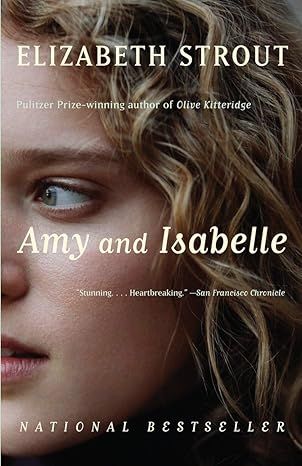
Amy and Isabelle: A novel
4.3
-
9,403
$3.34
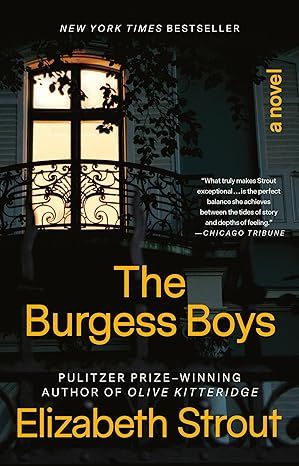
The Burgess Boys: A Novel
4.1
-
11,063
$2.11

Oh William!: A Novel
4.2
-
22,498
$5.04
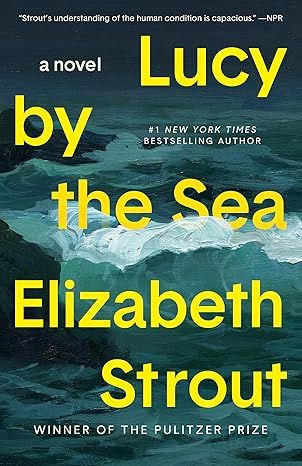
Lucy by the Sea: A Novel
4.3
-
18,461
$4.00
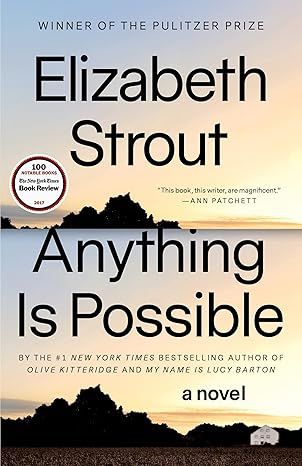
Anything Is Possible: A Novel
4
-
19,323
$5.35
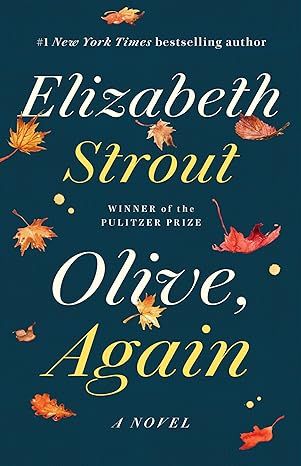
Olive, Again: A Novel (Olive, 2)
4.4
-
24,861
$9.76
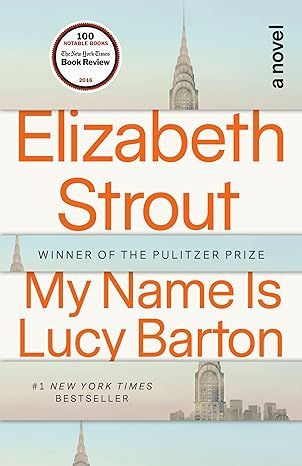
My Name Is Lucy Barton: A Novel
3.8
-
36,168
$7.94
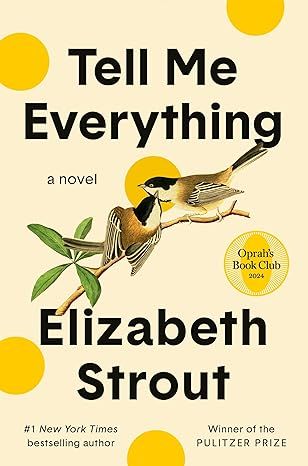
Tell Me Everything: Oprah's Book Club: A Novel
4.5
-
2,665
$14.99
Best Sellers

The Tuscan Child
4.2
-
100,022
$8.39

The Thursday Murder Club: A Novel (A Thursday Murder Club Mystery)
4.3
-
155,575
$6.33

Sapiens: A Brief History of Humankind
4.6
-
140,302
$13.49

The Butterfly Garden (The Collector, 1)
4.3
-
88,556
$9.59

Things We Hide from the Light (Knockemout Series, 2)
4.4
-
94,890
$11.66

The Last Thing He Told Me: A Novel
4.3
-
154,085
$2.99

The Perfect Marriage: A Completely Gripping Psychological Suspense
4.3
-
143,196
$9.47

The Coworker
4.1
-
80,003
$13.48

First Lie Wins: A Novel (Random House Large Print)
4.3
-
54,062
$14.99

Mile High (Windy City Series Book 1)
4.4
-
59,745
$16.19

Layla
4.2
-
107,613
$8.99

The Locked Door
4.4
-
94,673
$8.53
